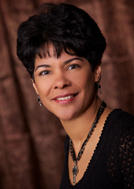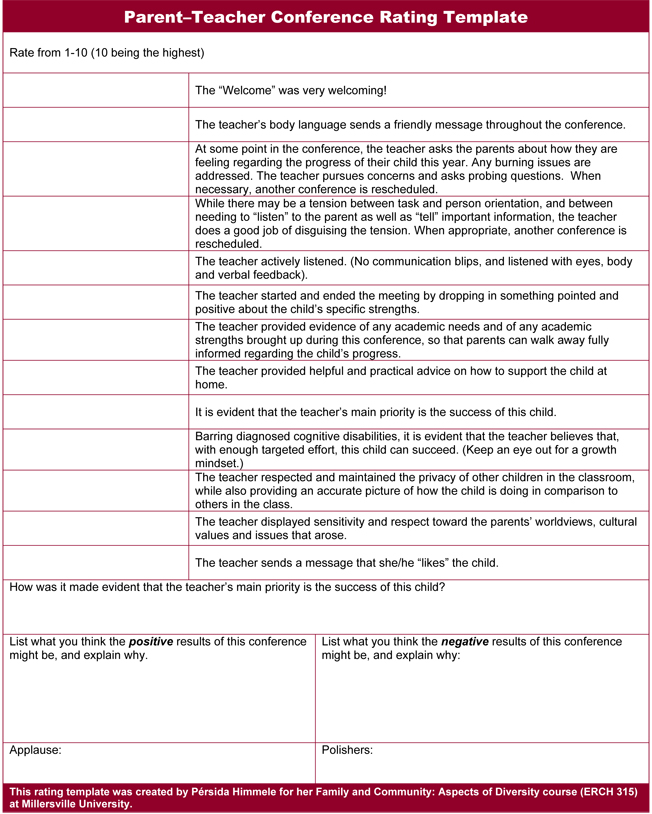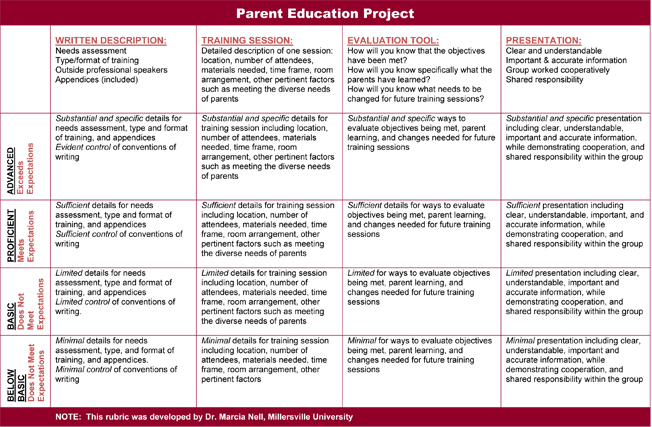The Harvard Family Research Project separated from the Harvard Graduate School of Education to become the Global Family Research Project as of January 1, 2017. It is no longer affiliated with Harvard University.

|
December 5, 2013 Teaching Future Educators and Families: Helping Maximize Children’s LearningPérsida Himmele
|
Related Resources
Classroom Family Engagement Rubric
This rubric from the Flamboyan Foundation provides districts, school leaders, and teachers with a clear picture of what effective family engagement looks like in the classroom by presenting concrete descriptions of how teachers demonstrate strong family engagement through their conversations and daily practice.
FINE Newsletter, Volume V, Issue 4
Issue Topic: Innovative Approaches to Preparing and Training Educators for Family Engagement
Voices From the Field
Pérsida Himmele discusses the intersection of pre-service teacher training and training for parents.
I remember starting a second-grade teaching position in an elementary school in California with a large Latino population, where I was told by my colleagues that parents were not involved in the school and that I should keep my expectations in check. Instead, I put a sign outside my door in Spanish that read, “Necesito Voluntarios” (I need volunteers). Five volunteers signed up that day.
From the first time teachers walk into their classrooms, they should assume that all families want to be engaged in their children’s education. My own parents were very invested in my education, and I therefore entered my teaching career with an understanding of the power that family engagement has to transform children’s learning experiences. I discovered, however, that most pre-service teachers lack extensive training in how to engage families to maximize children’s learning.
Knowing the value of future teachers’ learning family engagement skills, I try to address this knowledge gap through my current work as a faculty member at Millersville University, where I teach several courses for pre-service teachers. In each of these courses, I focus on the importance of engaging families. And because families are so crucial to their children’s success, I offer workshops and training for families to teach them ways that they can help enhance their children’s achievement. I learn a great deal from my work with these families; in fact, the parent workshops that I’ve conducted have probably been my most meaningful educational experiences so far, and have provided me with important lessons in family engagement that I can share with my pre-service students. Thus, in teaching families and future educators, I have been able to help both groups understand their important roles in helping children succeed.
PARENT WORKSHOPS: ENGAGING FAMILIES TO SUPPORT CHILDREN'S SUCCESS
An example of my work with families includes presenting five-session parent workshops targeted toward Latino parents with children in grades K–5 in three urban schools. I structure much of my approach within these workshops around the work of an organization in California called Parent Institute for Quality Education (PIQE). My sessions are based on the belief that families love their children but often need specific information so that they can help their children succeed in school. Parents are often unaware of the statistics that link family engagement with success, so I make this information available to them in the workshops, underscoring the importance of their participating in their children’s learning.
Among other activities, the workshops have included weekly assignments for parents. During week one, parents borrow an audio chapter book from their child’s school and listen to it with their child. During week two, parents set up a meeting with their child’s teacher to talk about how to help their child advance academically. During week three, parents talk to their child about the child’s academic and vocational future and practice the behaviors involved in active listening—focused eye contact, an encouraging touch, and undistracted time together. During the first three weeks, parents jot down questions and concerns that they want their child’s school principal to address. During week four, we set up a conversation with the principal of each child’s school in which the principal addresses the questions and concerns that the parents have written on their index cards. These meetings take place within a whole-group format, with the understanding that appointments can be made with the principal to discuss personal matters related to individual students.
During the final week, week five, we take all of the parents and their children on a group trip to Millersville University, where the education department provides them free cafeteria passes as well as gift bags with university merchandise. Several professors open their classrooms for a few minutes to give children and their families an opportunity to see a live lecture or class discussion and ask questions of them and their students. They also meet with students from our Latino student organization, who give the children and parents tours of the dorms and talk about what college is like. The dorm tours are a huge hit! On one occasion, during the bus ride back, some of the elementary-age students were already talking about sharing dorm rooms and arguing about what colors to paint their dorm-room walls. It was beautiful.
What I learn from these and other family training sessions that I facilitate informs my presentations to pre-service teachers, and I use the experiences of real families to emphasize important takeaways for my students. I share the stories that the parents tell, and talk about children’s reactions to their university trips. Quite importantly, these takeaways from my training sessions help teachers understand that parents appreciate being a part of their child’s learning and that parents are eager for teachers to discuss a range of topics with them related to their child’s success, including access to college. All in all, these workshops benefit everyone—the children, families, and in-service teachers.
PRE-SERVICE TEACHER TRAINING: GIVING FUTURE TEACHERS THE SUPPORT THEY NEED TO WORK WITH FAMILIES
I use a number of hands-on activities to help prepare teachers for the work that they will do with families. My hope is that these will help teachers put just as much weight on parent engagement as all of the other content they will be learning throughout their teacher candidacy. The activities I assign include the following:
Mock parent–teacher conferences. One activity that I frequently use in my work with pre-service teachers is mock parent–teacher conferences. I randomly select scenarios to present to my students and have them play the role of a parent one day and the role of a teacher on another day. Scenarios include situations in which parents who are learning English don’t feel qualified to help their children with homework or in which single parents need to work late. Practicing these scenarios prepares teachers for future conversations with real families. These mock conferences help my students learn to communicate in ways that show that they believe each child is capable of learning and succeeding. And taking on different roles helps these in-service teachers see situations from a number of perspectives so that they can be more mindful of how to communicate with families and students clearly and sensitively in the future. We come back to these takeaways throughout the course.
.jpg)
Table 1
Parent-Teacher Conference Rating Template

Planning a Back-to-School Night Event and a parent workshop. In my course, Family and Community: Aspects of Diversity, students work in groups to develop a Back-to-School Night Event and a parent workshop. The Back-to-School Night presentation is an in-class nongraded assignment. The parent workshop is a graded assignment for which I use a rubric created by Dr. Marcia Nell (see Table 2). The purpose of these assignments is to help students think about what really matters in terms of their communications with parents.
Table 2
Parent Workshop Rubric (download PDF)

So often when I’ve attended my own children’s back-to-school nights, I’ve found that teachers are very anxious about how much they want to cover with parents. The Back-to-School Night assignment in my course asks teacher candidates to really focus on the essentials so that they will feel comfortable about and prepared for their own conferences. Beforehand, we address such questions as: Do most parents really want to go line by line in the table of contents of your math and reading books? With your limited time with parents, what critical questions can you ask and answer? What themes are going to give you the most bang for your buck with parents? How might you bring in inspirational videos (Edutopia.com has a lot of great free educational videos, for example) to inspire parents and to help them really believe in the power of their influence on their own children’s education? In groups, teacher candidates plan their most essential content for a back-to-school night.
CONCLUSION
At the pre-service level, there is minimal preparation for family engagement. Teachers often enter their classrooms unprepared to engage families and to help them see the importance of their role in their child’s education. Faculty who teach pre-service teachers can change that by making family engagement a cornerstone of all of their courses instead of positioning it as an add-on or a dispensable piece of their instruction.
Pérsida Himmele is the mother of a middle schooler and a high schooler. She is an associate professor at Millersville University, in Pennsylvania, and with her husband has co-authored the books Total Participation Techniques: Making Every Student an Active Learner and The Language-Rich Classroom: A Research-Based Framework for Teaching English Language Learners.
This resource is part of the December 2013 FINE Newsletter. The FINE Newsletter shares the newest and best family engagement research and resources from Harvard Family Research Project and other field leaders. To access the archives of past issues, please visit www.hfrp.org/FINENewsletter.
